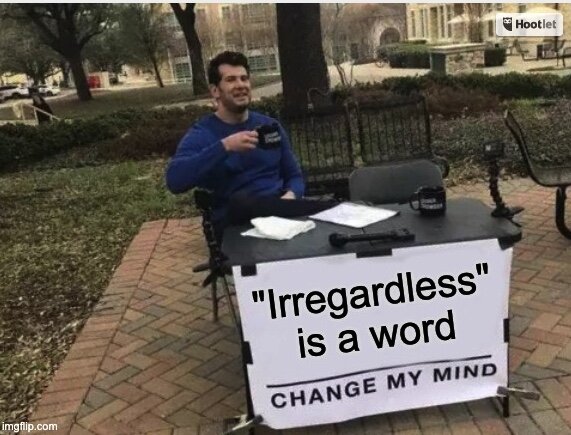The Final Word on “Irregardless” (and it’s not what you think)
Meme created by Judi 411 to annoy all of you to no end.
My friends, I just can’t let this one go.
The last time I declared that “irregardless” was officially a word, all y’all just about lost your ever-loving minds.
Maybe Judi 411 wasn’t good enough for you.
Maybe the Merriam-Webster dictionary wasn’t good enough for you.
Well, I’m back, and this time, I’ve brought in the big guns.
John McWhorter, the American linguist, and host of Slate’s “Lexicon Valley” podcast, completely agrees with me.
As I’ve said before, the dictionary isn’t the judge of our language ...but rather the court reporter of our language. It simply catalogs and records usage both past and present - both good and bad.
“But it doesn’t make sense,” they said.
“It’s a double negative!” they said.
But as McWhorter points out - the English language is full of redundancies and repetitions, yet somehow we only get irritated by some of them.
His take? “Irregardless” lost the popularity contest in middle school and can’t seem to shake the reputation of being a loser.
Okay, pop quiz. Have you ever said the following phrases:
Let me double-check.
That happens each and every time.
It sank down into the water.
I’m guessing you have. Welp - welcome to Redundancy Valley, population YOU.
Isn't it enough to check?
What’s the difference between each time and every time?
Do we ever sink up?
In the case of “irregardless,” McWhorter points out that the “ir” portion is simply an amplifier that has naturally taken place in the course of the spoken word. That redundancy is a point of emphasis when we really want to get our point across.
“Are you absolutely certain that you double-checked the lock on the lion cage? Because I’ve got 5 pounds of raw meat in my backpack, and I don’t want any unexpected surprises.”
So if you agree, as McWhorter and I do, that redundancies are common and not inherently bad AND that languages evolve (hello “selfie”) then can we all finally come to terms with the fact that “irregardless” has made its way into the realm of acceptable speech.
Therefore, “irregardless” qualifies as a word and remains in the dictionary for precisely this reason.
More importantly, there is little reason to judge any word as right or wrong. The function of language is to communicate - and we should judge words only on their ability to do so.
In other words: you know exactly what people mean when they say “irregardless,” so stop getting so worked up over a silly piece of language.
Now the Oxford Comma, on the other hand...don’t get me started.
P.S. As you may have guessed, John McWhorter is my linguistic expert crush (don’t judge) and if you’re not listening to his podcast, are you even living?

